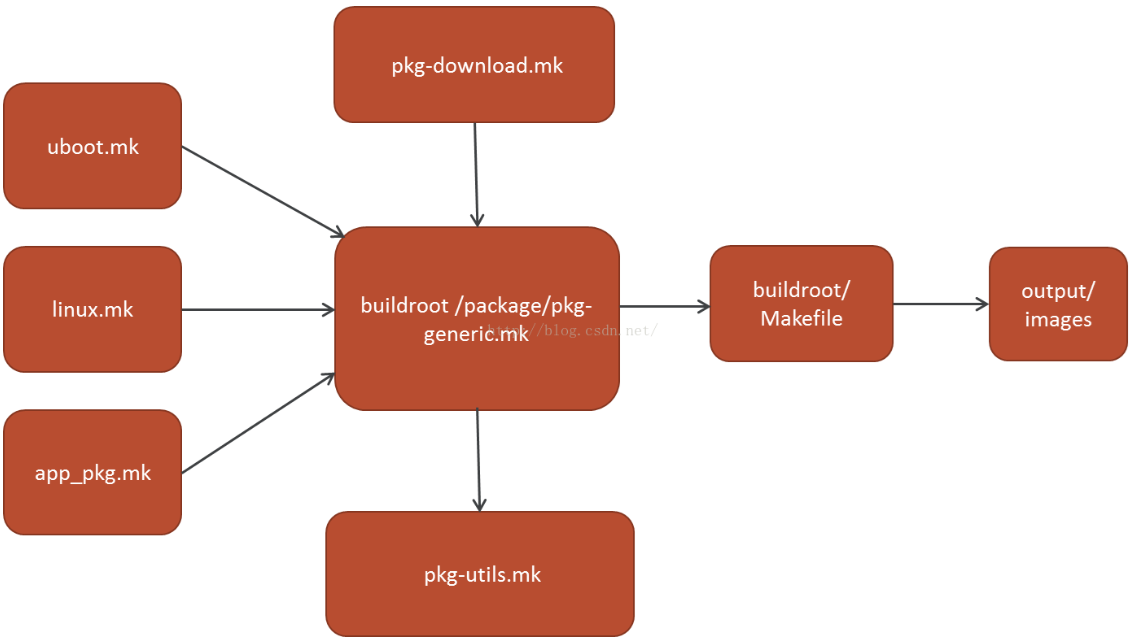(二)Buildroot介绍
详情请参考: http://www.buildroot.org/downloads/manual/manual.html
参考博客: https://www.cnblogs.com/arnoldlu/p/9553995.html
Buildroot是一个为嵌入式平台构建一个完整Linux系统的工具,它可以生成交叉编译工具、文件系统、Linux内核和bootloader。
目录结构
./buildroot$ tree -L 1 -d
.
├── arch
目录存放CPU架构相关的配置脚本,如arm/mips/x86 ,这些CPU相关的配置,在制作工具链,编译boot和内核时很关键。
├── board
存放了一些默认开发板的配置补丁之类的。
├── boot
├── configs
放置支持的开发板的默认配置文件。
├── dl
存放下载的源码包及应用软件的压缩包,第一次下载后,下次就不会再去从官网下载了,而是从dl/目录下拿开源包,以节约时间。本身下载通常都是很慢的,你可以手动找到相关包下载后放到这里就OK了,make时会自动检测这个目录。
├── docs
存放相关的参考文档。
├── fs
放各种文件系统的源代码;fs/skeleton:放生成文件系统镜像的地方,及板子里面的系统。
├── linux
存放着Linux kernel的自动构建脚本。
├── output
是编译出来的输出文件夹。
/buildroot/output$ tree -L 1 -d
.
├── build
所有源码包解压出来的文件存放地和编译的发生地。
├── host
是由各类源码编译后在你主机上运行的工具(build for host)的安装目录,如arm-linux-gcc就是安装在这里。
├── images
编译好的镜像。
├── staging -> /work/buildroot/output/host/arm-buildroot-linux-uclibcgnueabihf/sysroot
└── target
用来制作rootfs文件系统,里面放着Linux系统基本的目录结构,以及各种编译好的应用库和bin可执行文件。
├── package
下面放着应用软件的配置文件,每个应用软件的配置文件有Config.in和soft_name.mk。
├── support
├── system
这里就是根目录的主要骨架了和相关的启动初始化配置,当制作根目录时就是将此处的文件cp到output里去。然后再安装toolchain的动态库和你勾选的package的可执行文件之类的.
├── toolchain
└── utils
make命令使用
通过make help可以看到buildroot下make的使用细节,包括对package、uclibc、busybox、linux以及文档生成等配置。
Cleaning:
clean - delete all files created by build
distclean - delete all non-source files (including .config)
Build:
all - make world
toolchain - build toolchain
Configuration:
menuconfig - interactive curses-based configurator--------------------------------对整个buildroot进行配置
savedefconfig - Save current config to BR2_DEFCONFIG (minimal config)-----------保存menuconfig的配置
Package-specific:-------------------------------------------------------------------------------对package配置
<pkg> - Build and install <pkg> and all its dependencies-------------单独编译对应APP
<pkg>-source - Only download the source files for <pkg>
<pkg>-extract - Extract <pkg> sources
<pkg>-patch - Apply patches to <pkg>
<pkg>-depends - Build <pkg>'s dependencies
<pkg>-configure - Build <pkg> up to the configure step
<pkg>-build - Build <pkg> up to the build step
<pkg>-show-depends - List packages on which <pkg> depends
<pkg>-show-rdepends - List packages which have <pkg> as a dependency
<pkg>-graph-depends - Generate a graph of <pkg>'s dependencies
<pkg>-graph-rdepends - Generate a graph of <pkg>'s reverse dependencies
<pkg>-dirclean - Remove <pkg> build directory--------------------------------------清除对应APP的编译目录
<pkg>-reconfigure - Restart the build from the configure step
<pkg>-rebuild - Restart the build from the build step--------------------------------单独重新编译对应APP
busybox:
busybox-menuconfig - Run BusyBox menuconfig
uclibc:
uclibc-menuconfig - Run uClibc menuconfig
linux:
linux-menuconfig - Run Linux kernel menuconfig-----------------------------------------配置Linux并保存设置
linux-savedefconfig - Run Linux kernel savedefconfig
linux-update-defconfig - Save the Linux configuration to the path specified by BR2_LINUX_KERNEL_CUSTOM_CONFIG_FILE
Documentation:
manual - build manual in all formats
manual-pdf - build manual in PDF
graph-build - generate graphs of the build times----------------------------------对编译时间、编译依赖、文件系统大小生成图标
graph-depends - generate graph of the dependency tree
graph-size - generate stats of the filesystem size
buildroot框架
Buildroot提供了函数框架和变量命令框架(下一篇文章将介绍细节),采用它的框架编写的app_pkg.mk这种Makefile格式的自动构建脚本,将被package/pkg-generic.mk 这个核心脚本展开填充到buildroot主目录下的Makefile中去。
最后make all执行Buildroot主目录下的Makefile,生成你想要的image。 package/pkg-generic.mk中通过调用同目录下的pkg-download.mk、pkg-utils.mk文件,已经帮你自动实现了下载、解压、依赖包下载编译等一系列机械化的流程。
你只要需要按照格式写Makefile脚app_pkg.mk,填充下载地址,链接依赖库的名字等一些特有的构建细节即可。 总而言之,Buildroot本身提供构建流程的框架,开发者按照格式写脚本,提供必要的构建细节,配置整个系统,最后自动构建出你的系统。

对buildroot的配置通过Config.in串联起来,起点在根目录Config.in中。
配置选项 | Config.in位置 |
Target options | arch/Config.in |
Build options | Config.in |
Toolchain | toolchain/Config.in |
System configuration | system/Config.in |
Kernel | linux/Config.in |
Target packages | package/Config.in |
Target packages->Busybox |
|
Filesystem images | fs/Config.in |
Bootloaders | boot/Config.in |
Host utilities | package/Config.in.host |
Legacy config options | Config.in.legacy |



